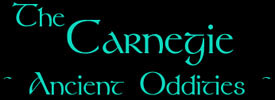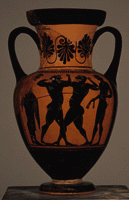


To be an athlete in ancient Greece meant literally "to compete for a prize." Prizes could be of material value (money or objects) or of symbolic worth, like the plain wreaths of leaves awarded at Olympia, Delphi, Isthmia and Nemea. At the Panathenaic Games in Athens the amphoras presented to victorious athletes were filled with a particularly high-quality grade of olive oil. It is said that the objects were gifted by the gods, so that any liquid stored therein would become blessed.
Attic Black Figure Amphoraca. 510-490 BC - Depicting a boxing contest or pugme. Two boxers wear soft leather himantes or boxing gloves. The man with the long stick is either a judge or trainer. A naked youth stands by, holding extra himantes.

Obverse Type: Head of Apollo, laureate, three-quarter face r.; to r., panther l.
Reverse Type: AMPHIPOLITE‘N on raised frame within which race torch; all within incuse square
These particular coins were minted for the games at Olympus - that later became the modern Olympic Games. These coins were said to bring good luck to those that carried them.

In Greek mythology, Gaia is terra mater, the mother Earth, and the oldest of the goddesses. She is the personification of the "all-mother", she who gives and takes life. She sprang from Chaos, and in turn bore from herself Pontus (the sea), and Uranus (the sky) and married him. Their children are the Titans, the Cyclopes, and the Hecatonchires. With Tartarus she is the mother of the monster Typhon.